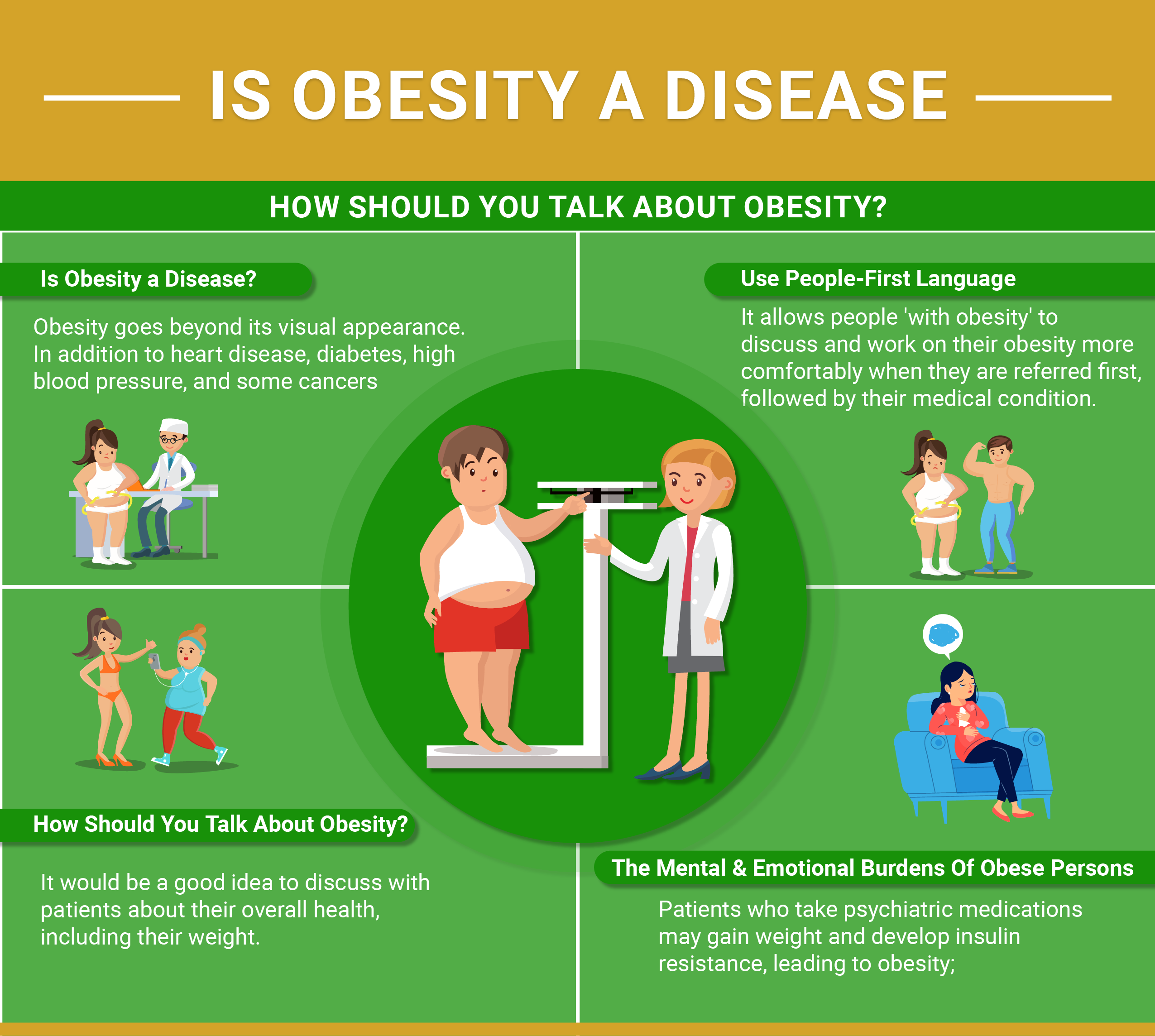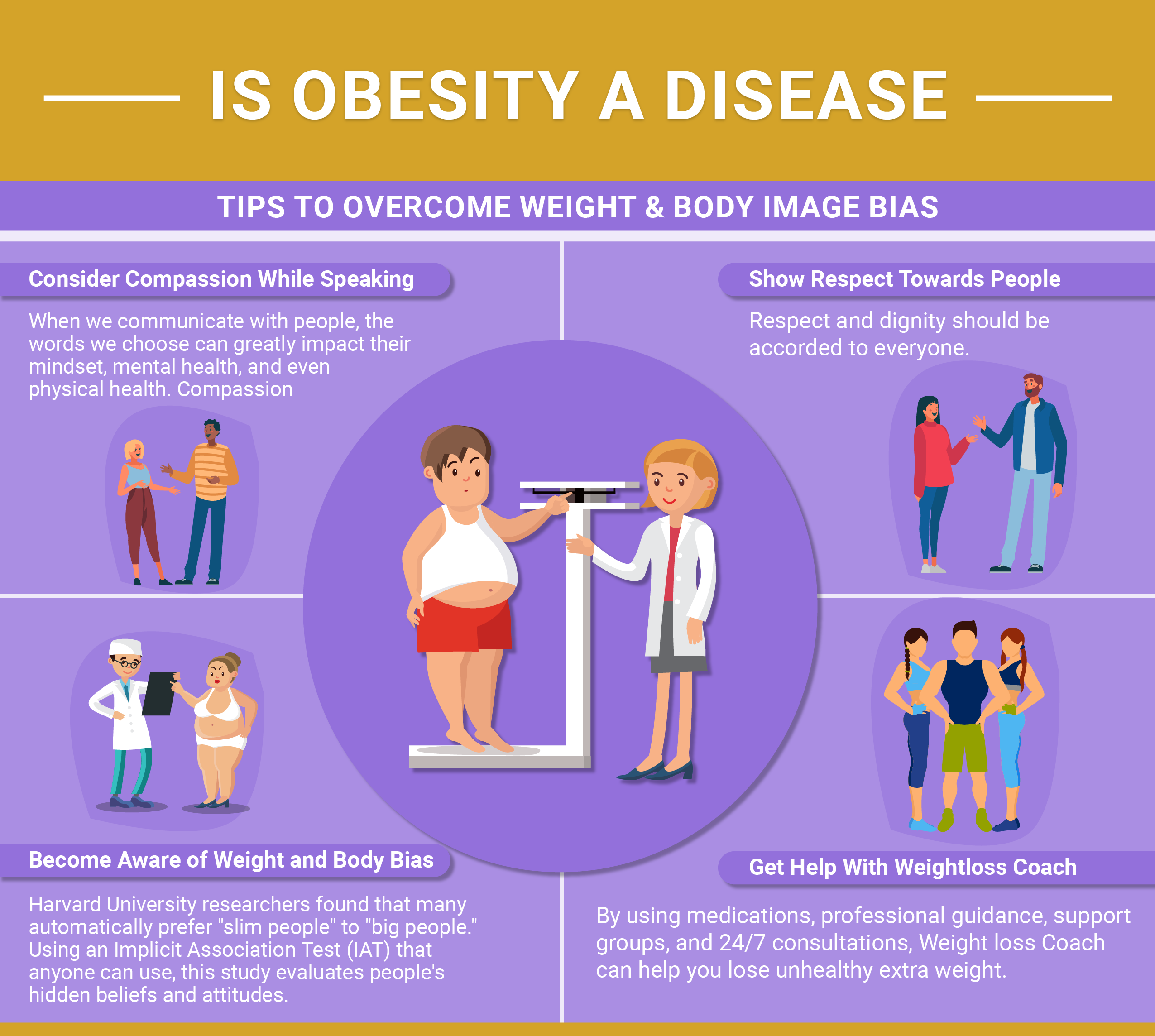Obesity refers to an excessive amount of body fat in a person. The problem of obesity goes beyond its visual appearance. In addition to heart disease, diabetes, high blood pressure, and some cancers, it raises the risk of many illnesses and conditions.
Some people have difficulty losing weight for a variety of reasons. Exercise, physical activity, and lifestyle choices contribute to obesity and dietary, physiological, and environmental factors.
Fortunately, even a small amount of weight loss can help prevent obesity-related health problems. A healthy diet and more physical activity can help you lose weight. Weight loss techniques and prescription drugs are other options for managing obesity.

Provide a courteous, nonjudgmental introduction to the topic of weight. It may be easier for patients to be forthcoming if they feel valued. Don't be judgmental or rude when discussing weight. Before asking patients about their weight, explain the health risks associated with obesity and being overweight.
Weight should be considered the cause of only some patient issues, such as throat infections. The first thing you should do is address your patient's primary health concerns. Discuss other matters that may harm their mental or emotional health, such as family or work issues.
It would be a good idea to discuss with patients about their overall health, including their weight. Pay attention to cultural differences in weight, preferred cuisines, and social mores among your patients. It may be more effective to recommend weight maintenance to individuals who believe their weight is appropriate for their culture than to recommend weight loss.
The stigma and bias associated with obesity for decades have resulted in increased stress and mental pressure for people suffering from obesity. Rather than referring to people with obesity as 'obese,' we should refer to them as 'obese' to avoid bias and stigmatization.
By eliminating this burden, they can talk about their problems and medical conditions more often and freely. Several imbalances in a person's body can lead to obesity which can further cause health problems. It's about time that people start understanding obesity isn't a lifestyle choice but rather a medical condition.
It allows people 'with obesity' to discuss and work on their obesity more comfortably when they are referred first, followed by their medical condition. This approach is known as people-first language because it prioritizes the individual over their medical condition.
Providing weight loss programs through professional medical approaches with medications prescribed by doctors by the Weightloss Coach is a people-first language, an initiative by the Calibrate association that helps people with obesity and excessive weight achieve their weight loss goals, reset their biology, and reset their metabolism.
Several studies have shown that weight and mental health are closely related. There is an inverse relationship between obesity and mental health problems. Conversely, obesity increases the risk of mental disorders, especially among some groups. Mental health disorders also increase the risk of obesity. Mental health issues can cause obesity for a variety of reasons.
However, fat increases the risk of depression. Several intricate factors probably contribute to this, including low self-esteem and depression caused by weight stigma and bias, reduced activity caused by back pain caused by obesity, and biological disruptions caused by fat cells releasing chemicals when a person is overweight.
Several factors are involved in the relationship between obesity and mental health. The mental health of patients with mental health conditions should be closely monitored, as well as the mental health of obese patients.

In our society, obese or overweight people are treated with stigma due to a lack of compassion and understanding that obesity or overweight is a medical condition. Our society struggles with several weight and body image issues, and some effective ways to overcome and treat these issues are as follows:
When we communicate with people, the words we choose can greatly impact their mindset, mental health, and even physical health. Compassion can be added to your speech in two basic ways, as well as being mindful of it when communicating with others:
We must first recognize our potential views and presumptions to combat the stigma associated with being overweight. Who are obese people, in your opinion? Among the most common forms of bullying, being called fat is the most common motivation.
Harvard University researchers found that many automatically prefer "slim people" to "big people." Using an Implicit Association Test (IAT) that anyone can use, this study evaluates people's hidden beliefs and attitudes.
Respect and dignity should be accorded to everyone. Can you help end the weight bias? Here are a few tips:
An obese person should always be treated with compassion, care, and respect since obesity is not a lifestyle choice. Despite our society's general body and weight bias, small changes can change how society perceives obesity and obese people.
Medical intervention, dietary, and lifestyle changes are necessary to address obesity effectively since obesity can lead to many different types of illnesses.
Many people find it difficult to address obesity through the treatment mentioned above, which is why Weightloss Coach offers a credible online weight-loss program. By using medications, professional guidance, support groups, and 24/7 consultations, Weight loss Coach can help you lose unhealthy extra weight.

Comments